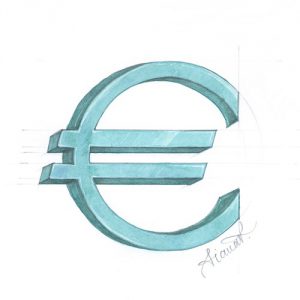 If you’re American, British, or Portuguese, you probably say 2 euros rather than 2 euro. If you’re German or Italian, you probably say 2 euro. So, what’s the plural of euro? Euro or euros?
If you’re American, British, or Portuguese, you probably say 2 euros rather than 2 euro. If you’re German or Italian, you probably say 2 euro. So, what’s the plural of euro? Euro or euros?
As a freelance nonfiction editor, I get to review many documents that contain financial information, and the plural of euro is a topic that comes up often in my editing work. So, I had to do research on this topic to be able to give my clients accurate advice. This research turned out to be quite interesting. In this article I’d like to share this information with you so that you have no doubts about the plural of euro, no matter what you write in English.
In short, the correct plural of euro is euro or euros, depending on whom you ask or what dictionary you consult. Let’s look at the brief history of the euro currency so you understand why the correct plural of euro is either euro or euros.
One euro, two euro, two euros
In most of the English-speaking world, euros is the commonly used plural of euro.
For native English speakers, it’s natural to add -s to form the plural—just like the plural of dollar is dollars and the plural of pound is pounds. But when speaking English, a German or an Italian is likely to use the plural euro. Some native English speakers use the plural euro as well.
Also, if you look at a 50-euro note, it has “50 euro” written on it. Does that mean the “official” plural of euro is euro?
The answer to the question, “What’s the plural of euro?” lies in the history of this currency.
The history of the euro
The euro as a currency, and as a word, is special. Unlike a national currency (the Swiss franc, for example), “the euro was created as the currency without a state”, as one author wrote.
The euro is a single currency of the countries belonging to the euro area. These countries have different languages. So, the inventors of the euro wanted to choose a word for the single currency that would be spelled the same in the languages of these countries, “taking into account the different alphabets”. That’s the reason the 50-euro note bears the words EURO (in Latin alphabet), as well as EYPΩ and EBPO in Greek and Cyrillic alphabet, respectively.
Before introducing the euro as a currency, EU legislators decided the plural of euro in English, as well as in Italian and German, would be euro. A member of an online forum said EU legislators adopted the invariable plural euro “fearing that the use of different spellings for the single currency might lead to legal problems…but…some countries (France, Spain, Portugal) immediately obtained derogations allowing them the plural inflections natural to their languages”.
Eventually, EU countries adopted the plural they wanted, and the European Commission is fine with that. On its web page, you can read, “in documents other than EU legal texts, including national legislation, other spellings [of euro] are accepted according to the various grammatical rules used in each language”. As long as the root eur- remains the same, “plural forms and declensions are accepted”.
Some countries, such as Italy and Germany, chose the plural euro. Other countries, such as France, Slovenia, Spain, and Portugal, chose the grammatically correct versions in their languages.
What does the dictionary say?
What’s the plural of euro according to an English dictionary?
In English, both versions (euro and euros) are correct and remain in use, euros because it’s the natural plural, and euro because it’s the version used in EU legislation. Most of the dictionaries and style guides I consulted list both forms:
- Merriam-Webster’s Collegiate Dictionary: euros, euro
- Collins Dictionary: euros
- Cambridge Dictionary: euros
- Dictionary.com: euros, euro
- The Free Dictionary: euros, euro
- Encarta Essential English Dictionary: euro, euros
- Macmillan Dictionary: euros, euro
- New Oxford Style Manual: euros, euro
- Chicago Manual of Style (17th edition): euros (but euro in EU documents)
- European Commission English Style Guide: “Where appropriate, it [the euro] takes the plural ‘s’”
So, what’s the plural of euro in English?
In English, both euro and euros are the correct plural of euro—though euro tends to be less popular in everyday speech. However, EU legislators use the plural euro. If you’re not one of them, here’s the advice of a freelance editor: use the version you like. Chances are you already have a very strong preference—just like a member of the Stack Exchange forum, who wrote, “Euros sounds to me as bad as Legos”.
Do you need a freelance editor for your business reports? Send me a message at editor@languageediting.com.
Related posts:
- Number formatting in Europe vs. the US
- Is it OK to use many abbreviations in a paper?
- Should you use trademark symbols in scientific writing?
Last revised on 21 June 2022
